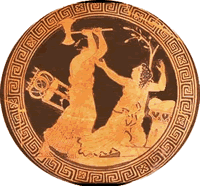
4) simple and complex plots
Aristotle observes a distinction between two forms of plot structure in Greek tragedy.

| simple plot |  |
 |
|
| complex plot |  |
 In order to make a distinction between a simple plot and a complex plot, Aristotle looks for the existence, or lack of it, of two ingredients – peripeteia and sudden recognition. Both of these processes may happen in slow motion in a tragedy with a simple plot, but in the case of the complex plot, he is seeking the sudden or explosive moments in which everything is upset, and the potential good fortune of the tragic hero is instantly undone. In describing the first of the two ingredients, Aristotle offers the example of the scene in Oedipus Rex in which the Corinthian messenger announces the death of King Polybus. While this announcement causes Oedipus to feel relieved of the prophecy that he will kill his own father, he still expresses fear that he will fulfill the other half of the prophesy and marry his mother. In an effort to reassure him, the messenger explains that Marope and Polybus are not Oedipus' parents. This effort has precisely the opposite effect than the one intended, and leads to the immediate discovery that Oedipus has, indeed, fulfilled the prophesy in killing Laius and marrying Jocasta.
In order to make a distinction between a simple plot and a complex plot, Aristotle looks for the existence, or lack of it, of two ingredients – peripeteia and sudden recognition. Both of these processes may happen in slow motion in a tragedy with a simple plot, but in the case of the complex plot, he is seeking the sudden or explosive moments in which everything is upset, and the potential good fortune of the tragic hero is instantly undone. In describing the first of the two ingredients, Aristotle offers the example of the scene in Oedipus Rex in which the Corinthian messenger announces the death of King Polybus. While this announcement causes Oedipus to feel relieved of the prophecy that he will kill his own father, he still expresses fear that he will fulfill the other half of the prophesy and marry his mother. In an effort to reassure him, the messenger explains that Marope and Polybus are not Oedipus' parents. This effort has precisely the opposite effect than the one intended, and leads to the immediate discovery that Oedipus has, indeed, fulfilled the prophesy in killing Laius and marrying Jocasta.

Clearly, the lowest ranking item on Aristotle's list of plot structures is the episodic plot. Aristotle makes it evident that the reason for his contempt for such plots has to do with the seemingly arbitrary movement of such plots from one event to another. Absent the propelling logic of the necessary or the probable, the causal mechanism that moves the plot is missing, and the sequence of events fail to gain momentum on its own.
Beyond his disdain for episodic plots, however, it is not entirely clear why Aristotle finds simple plots to be categorically less artful than complex ones. Assuredly, the surprise of unexpected events that have their own logical cause is pleasing to an audience, but there are also several profound and powerful Greek tragedies within which such surprises would be inconsistent, and inappropriate. It is difficult, for example, to insist that Euripides' The Trojan Women is less artful than Oedipus Rex simply on the basis of its structure. In fact, there are several extant tragedies that derive their power from the unremitting progress of destructive forces that is best dramatized via a simple plot.